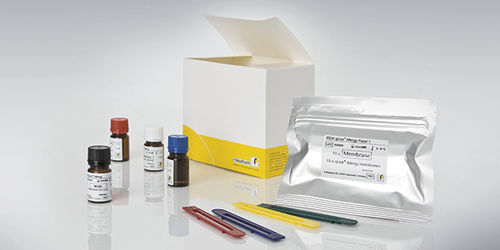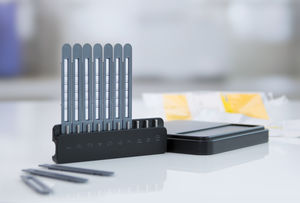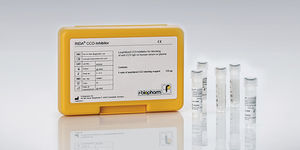
- Laboratory
- Laboratory medicine
- Allergy test kit
- R-Biopharm AG
Allergy test kit RIDA qLine® allergen-specific IgEleadbacteria
Add to favorites
Compare this product
Characteristics
- Applications
- allergy
- Tested parameter
- allergen-specific IgE, lead
- Micro-organism
- bacteria
- Sample type
- serum, plasma
- Analysis mode
- enzyme immunoassay
- Format
- strip
- Result display time
110 min
Description
For in vitro diagnostics. This test is an enzyme immunoassay on a nitrocellulose membrane (immunoblot) for the quantitative detection of allergen-specific IgE antibodies in human serum and plasma (citrate).
General information:
The immune system’s task is to protect the organism against pathogenic bacteria, viruses and other microorganisms. The defense reaction protects the organism on first contact with the pathogens, but also provides immunization for recurring exposure. All allergic reactions are preceded by a symptom-free first contact, where specific class E antibodies (IgE antibodies) were already formed. On repeated contact with the triggering allergen these IgE antibodies react with the allergen and cause the release of mediators (usually from mast cells) like histamine, leukotriene, prostaglandin etc., which lead to the allergy symptoms. By detecting the specific IgE antibodies in the serum the triggering allergens can be identified, if there are allergic reactions. But also already existing sensitizations without symptoms can be detected here.
Advantages:
Economic: allergen panels with up to 20 allergens for effective screening
Quantitative: real standard curve on each strip (calibrated against the international reference preparation “2nd WHO IRP 75/502 for specific IgE”)
Customized: customer-specific allergen compositions for flexible and individual diagnostics
Easy: standardized and convenient performance and evaluation
Reliable: high concordance of the results for the same allergen with the same sample on different panels and high accuracy of the results in low range results (RAST class 0 – 2)
Catalogs
Related Searches
- Assay kit
- Solution reagent kit
- Blood assay kit
- Serum assay kit
- Immunoassay assay kit
- Plasma assay kit
- Infectious disease detection kit
- Diagnostic reagent kit
- Rapid lateral flow test
- Immunoassay rapid diagnostic test
- Molecular test kit
- Respiratory infection test kit
- Clinical assay kit
- Infectious disease rapid diagnostic test
- Cassette assay kit
- Lateral flow test kit
- COVID-19 detection kit
- ELISA assay kit
- Real-time PCR test kit
- Quality control reagent kit
*Prices are pre-tax. They exclude delivery charges and customs duties and do not include additional charges for installation or activation options. Prices are indicative only and may vary by country, with changes to the cost of raw materials and exchange rates.





